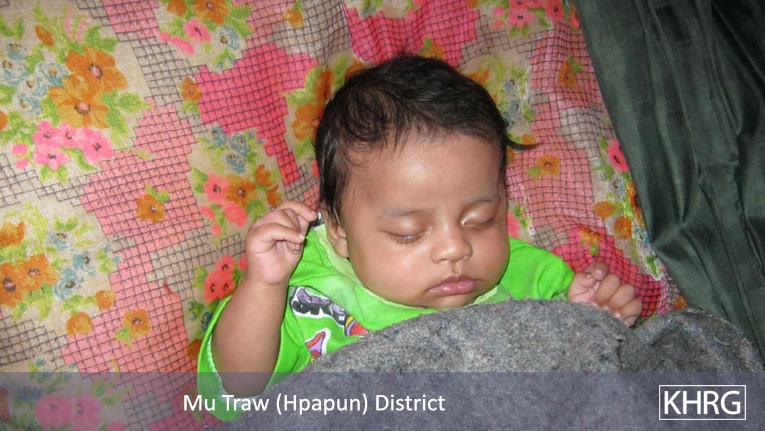


This photo, taken on January 1st 2011, shows three-month-old Saw G---. His mother was shot and killed by Tatmadaw soldiers on October 13th 2010, less than 45 minutes after he was born. [Photo: KHRG]
On January 1st 2011 a KHRG researcher met with Saw P---, 37, who described how his wife Naw M---, 24, had been shot and killed by Tatmadaw soldiers on October 13th 2010 during an attack on A--- village, Lay Kaw Htih village tract, Dweh Loh Township, Papun District. The shooting occurred at the home of Saw P--- and Naw M---, just 45 minutes after Naw M--- had given birth to their third son. Saw P--- said that he fled his home with their newborn baby after bullets struck his wife in her thigh and her neck. Saw P--- described to KHRG how, after he fled his village, he spent two months living in the forest caring for his newborn son, before seeking refuge at a site outside Papun district. In the following quote, Saw P--- describes in his own words the attack in which his wife was killed, and the difficulties he has faced caring for his infant son in the intervening months.
"My wife's name is Naw M--- and she was shot and killed on a Wednesday morning, on October 13th 2010, while there was a big light coming from the fire in my house and the midwife was busy, helping my wife to deliver her baby. I built my house at the edge of the village, on the border of the forest and the village. My wife was shot after she knew it was a baby boy, and she named her baby Saw G---. When she was shot, there wasn't much blood coming out because a lot of her blood had come out when she delivered her baby. Then everyone was trying to hide. At that time, it was an important period for farming [the harvest] and most of the villagers in the village were spending the night at their farms [sleeping in field huts].[1] When the attack happened, there weren't many villagers in the village. After the attack, I went back and buried my wife's dead body at 1 pm, with not many people helping me. Then I went up to my hill field hut and stayed with my newborn baby and his two elder brothers. I just fed my newborn baby the excess rice water mixed with sugar for two months. Then I had no money and only some sugar left, which people from the village gave to me for my baby, and I decided to go somewhere. During that time, some people requested to adopt my son and some suggested that I give him to people to adopt. But I made up my mind that I'd take care of him myself and if he died he'd die in my hands and, if he stayed alive, he'd be very much still alive under my care. After my wife died, before I came here [a refuge site outside of Papun district], I stayed in the forest for two months. I had no plan to come here. People told me, 'If you move to that village, you might have a better life.' I just came step by step and, later, I decided to come here. It took me six days. I left my hill field on December 15th 2010 and arrived on 20th December 2010. When I stayed in my village, I just farmed hill fields and I could earn very much and work with other people in their flat fields. N--- and P--- villages were close to my village. Also a reason I left my village was because I worried for myself, that if people said to join the army,[2] then I'd join and I wouldn't be able to control myself. I didn't want to stay there [in A--- village] anymore and when I stayed there I always remembered my wife whenever I looked at my baby. When I arrived here, I didn't want to go back, too. Whenever my baby cried, I directly saw my wife's face. Also saw the face of Burmese [Tatmadaw] soldiers. I hate them, but I can't do anything to them. I comfort myself that my wife's fortune was good up until now. But if I have time and an opportunity, I'll go back and call my eldest child to here. When I came, I couldn't bring him because I couldn't carry all of them [the children]. I left him with Aunty and Uncle there. My second son is here and he's happy here because there are a lot of his friends that he can play with. My baby also receives good care and he can get milk powder here. People come and help me a lot, nursing my baby and cooking rice for me sometimes."
- Saw P--- male, 37 years old, former resident of A--- village, Lay Kaw Htih village tract, Papun district (January 1st 2011)
Indiscriminate attacks on civilians such as that which killed Naw M--- appear to form part of a wider pattern of Tatmadaw military practices that cumulatively target civilian populations in areas over which Tatmadaw forces cannot, or have yet to, establish effective military control.[3] Such attacks continue to occur more than two years since the termination of a three-year-long military offensive,[4] during which attacks on civilians in difficult-to-control upland areas of Northern Karen State were a central and defining feature. A conservative estimate suggests that, in the first half of 2010 alone, at least 13 civilians were killed by Tatmadaw troops operating in Papun, Nyaunglebin and Toungoo Districts.[5] Pregnant women are particularly vulnerable to physical injury and death arising from the unstable military situation in Karen State[6] and, in the past two months, KHRG has reported incidents in which pregnant women have given birth, miscarried[7] or been killed by mortars[8] while fleeing from military hostilities in other parts of Karen State.